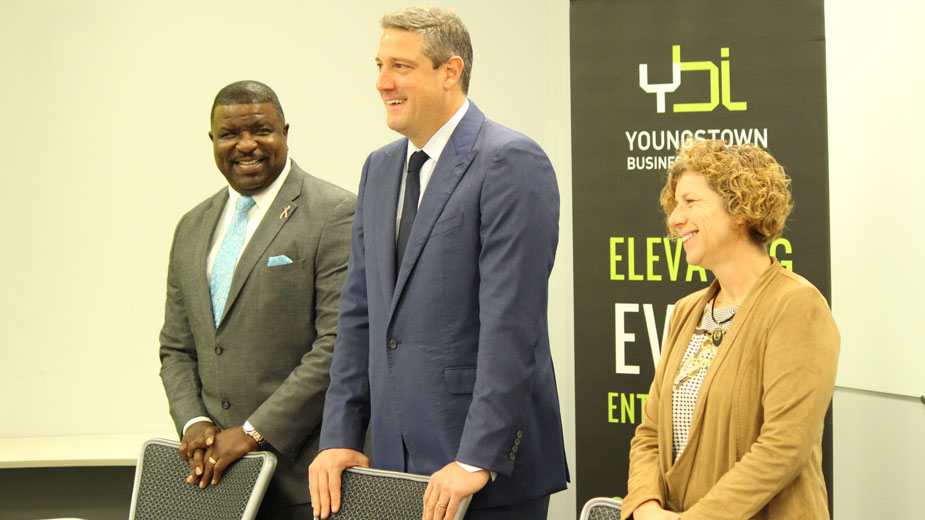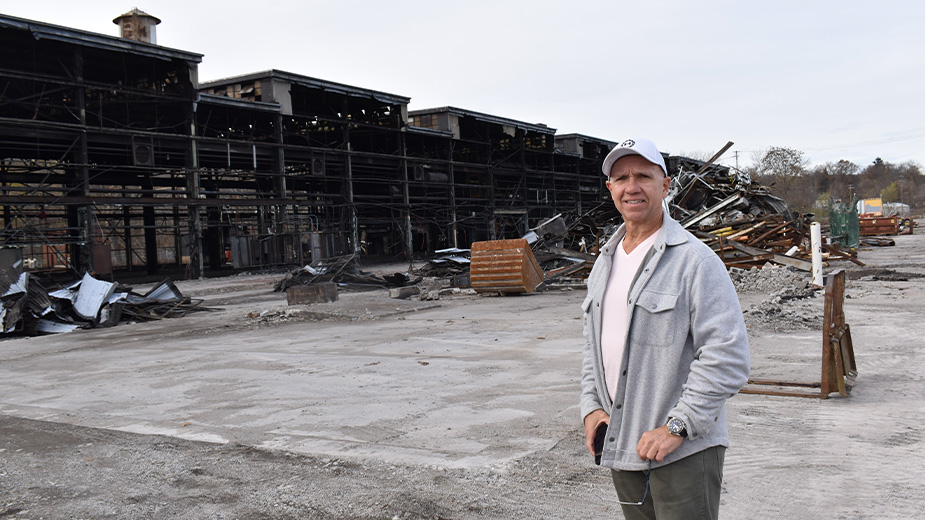Comeback Capital Fund Connects Startups with Investors
YOUNGSTOWN, Ohio – Local officials touted a newly created venture capital fund as a vehicle to connect startups in the region with even greater access to capital than the fund itself will provide.
At a news conference Tuesday at the Youngstown Business Incubator, U.S. Rep. Tim Ryan, Mayor Jamael Tito Brown and Barb Ewing, CEO of the YBI, announced the creation of the $2.25 million Comeback Capital Fund, which they said will expose investors from the East and West coasts to opportunities that they otherwise wouldn’t see.
The fund pools money from more than 30 individuals and funds from Midwestern and coastal investors. It is intended to provide early-stage funding for companies in the Midwest and western Pennsylvania, said Scott Shane, managing director.
The initiative is an outgrowth of the Comeback Cities Tour that Ryan, D-13 Ohio, and U.S. Rep. Ro Khanna, D-17 Calif., kicked off in Youngstown in February. The Democratic congressmen took a group of venture capitalists to Midwest cities that included Detroit and South Bend, Ind. It will provide investments of up to $100,000, Ewing said, but the fund’s value extends beyond those initial dollars, she and Ryan agreed.
The Midwest has “a lot of overlooked companies” that offer high-growth opportunities that can create wealth and jobs, Ryan said. “We want to find them. We want to put money in them and then we want to attract bigger money from the coasts,” so those companies can grow, he said.
In addition to funding, partners in the fund will be required to provide mentoring to companies that receive the funding.
According to Ryan, 80% of U.S. venture capital is concentrated in three states: California, New York and Massachusetts. During the Comeback Cities bus tour, the venture capitalists suggested establishing a fund to provide money for Midwest startups, he said.
“This fund is another great asset in building a tool chest, as we say in economic development, to create the companies that we need to grow the economy locally,” Ewing said.
The single biggest challenge startups face is early-stage capital, in particular funding to get them from the concept stage to making a product, she said. Often, startups go where venture capital is located, an issue she acknowledged has led to loss of opportunities for the Mahoning Valley economy. That is one of the reasons Valley Growth Ventures, a locally based fund launched earlier this year, was created, she said.
“Companies need to be located where their customers are, but if you can’t raise money you go to where the capital is,” said Shane, who joined the news conference by phone.
Companies that are solving problems in the Midwest need to stay there because that’s where their customers do business. “The capital should be the thing that’s mobile. The capital should move to where the opportunities are,” Shane said.
That was among the points that evolved during the bus tour earlier this year, Ryan said. The venture capitalists saw innovation taking place to solve problems here that were often different from those where they were based. While they are interested in the region because of its comparatively low cost of doing business and similar factors, they also are being exposed to opportunities they might not see otherwise.
“Opportunities come from solving problems that customers have,” Shane said. “If you’re only in one place like northern California, you can only focus on the problems that are being solved in that area.”
Maybe the “big problem” that needs to be solved involves manufacturing automation, he said. “If that’s the problem, you’ve got to be where the manufacturers are and you’ve got to back the companies doing that. I believe that’s what the investors see as the opportunity.”
Large investors with a lot of access to capital tend to overlook smaller deals because they are “a headache to manage,” Ewing noted.
“This is a way for us to gain access to investors who come into the pool to get to know us,” she said. Once they become familiar with the startups participating in the fund, those investors can do “sidecar deals” with these companies for larger investments “without them having to go through the headache of the due-diligence process,” she said.
“It really creates an open-door policy with them, where they otherwise just wouldn’t in most cases expend the energy to look at a small deal,” she continued.
“You get credibility. You get a seal of approval from these partners that are a part of this,” Ryan added.
“This is just a first start moving forward with being competitive, not just in the state of Ohio but around the U.S.,” Brown said.
With backing from the Burton D. Morgan Foundation, the fund will host an event next spring in Youngstown for investors and startups from around the Midwest, Ewing said.
The fund already has made two investments, neither from the Mahoning Valley, Shane acknowledged.
One was to Milwaukee-based Exit 7C, which provides high ethanol fuel through branded pumps at gas stations and delivery to customer locations. Three of the fund’s limited partners invested alongside the fund at a 4.5-to-1 ratio, he reported. A second company based in Cleveland that did not want to be identified received funding as well.
“We would love to get great, high-growth startups in the Mahoning Valley referred to us as well as great, high-growth companies in the rest of the Midwest,” Shane said.
Copyright 2024 The Business Journal, Youngstown, Ohio.



